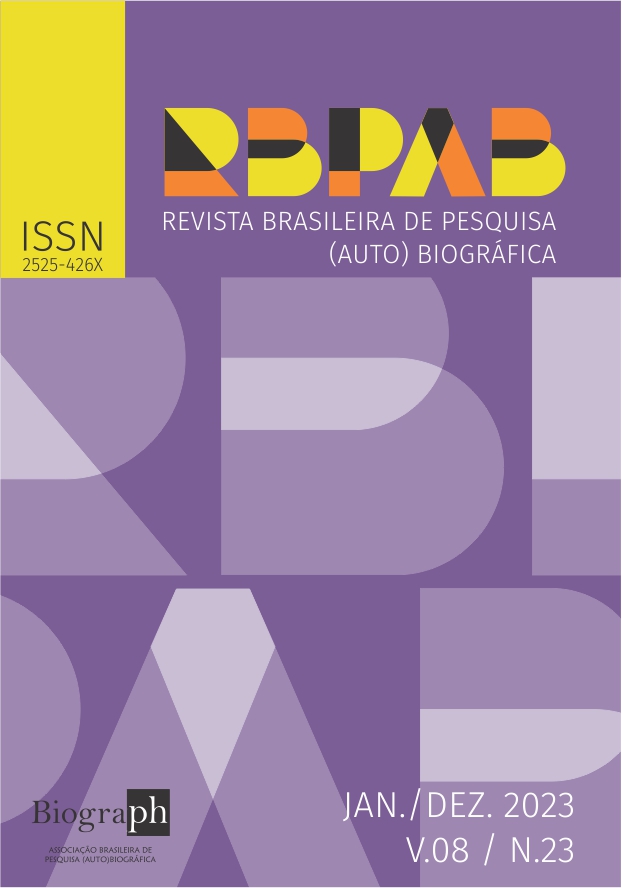(Auto)biographies of a polyvalent teacher: narratives of life, work and education
DOI:
https://doi.org/10.31892/rbpab2525-426X.2023.v8.n23.e1140Keywords:
Narrative. (Auto)biography. Teacher training. Early Childhood Education. Elementary School.Abstract
This work aims to investigate how the trajectory of academic and professional life constitutes the gaze of a teacher. It has as corpus of analysis an (auto)biographical report of a teacher graduated in Pedagogy from the following question: today, with all the knowledge through studies and the experience lived as a student and as a teacher, what would you apply to your students and how would you advise them to do differently based on your experiences and knowledge? In the analysis, we paid attention to the search for evidence of the fragments reported in accordance with the objective and the guiding question. The question raised and the proposed objective allow us to infer that (trans)forming education is not the education that is based on the success or failure of the students, but on the educational process that is in progress: the one that involves the contradictions of knowing or not knowing, doing, and learning.
Downloads
References
CHARLOT. B. Da relação com o saber: elementos para uma teoria. Tradução de Bruno Magne. Porto Alegre: Artmed, 2000.
CHARLOT. B. Da relação com o saber às práticas educativas. Coleção docência em formação: saberes pedagógicos. 1. ed. São Paulo: Cortez, 2013.
DELORY-MOMBERGER, C. Fundamentos epistemológicos da pesquisa biográfica em educação. Educação em Revista. Belo Horizonte, v. 27, n. 1, p. 333-346, 2011. Disponível em: https://www.scielo.br/j/edur/a/xhw4bbpW3HZkPQZhTtWLcbH/. Acesso em: 13 jan. 2023.
DOMINICÉ, P. A formação de adultos confrontada pelo imperativo biográfico. Educação e Pesquisa, São Paulo, v. 32, p. 345-357, maio/ago. 2006. Disponível em: https://www.revistas.usp.br/ep/article/view/28014/29805. Acesso em: 13 jan. 2023.
FREIRE, P. Pedagogia da autonomia: saberes necessários à prática educativa. 65. ed. Rio de Janeiro/São Paulo: Paz e Terra, 2020.
MARSIGLIA, A. C. G. A prática pedagógica histórico-crítica na educação infantil e ensino fundamental. Campinas: Autores associados, 2011.
PEREIRA, D. N. G. Por entre olhares, o humano: processos de constituição de uma criança (com autismo) no segundo ano do ensino fundamental. 2022. Tese de doutorado (Doutorado em Educação) – Programa de Pós-Graduação Stricto Sensu em Educação, Universidade São Francisco, Itatiba, 2022.
OLIVEIRA, E. C. de. Prefácio. In: FREIRE, P. Pedagogia da autonomia: saberes necessários à prática educativa. 65. ed. Rio de Janeiro/São Paulo: Paz e Terra, 2020.
PORTOCARRERO, V. Instituição escolar e normalização em Foucault e Ganguihem. Educação e Realidade, 29 (1): pag. 169-185. Jan/ 2004. Disponível em: https://seer.ufrgs.br/index.php/educacaoerealidade/article/view/25424. Acesso em: 13 jan. 2022.
SAVIANI. D. Escola e democracia. 44. ed. Campinas, SP. Autores associados, 2021.
SOBRAL, A. O ato “responsível”, ou ato ético, em Bakhtin, e a centralidade do agente. Signum: Estudos da Linguagem, v. 11, n. 1, p. 219-235, 2008. Disponível em: https://www.researchgate.net/publication/277794247_O_ato_responsivel_ou_ato_etico_em_Bakhtin_e_a_centralidade_do_agente Acesso em: 21 dez. 2022.
VEIGA-NETO, A. É preciso ir aos porões. Revista Brasileira de Educação, v. 17, n. 50, p. 267-282, 2012. Disponível em: https://www.scielo.br/j/rbedu/a/tqdG7b3B787cXjdYvSfLhhx/ Acesso em: 21 dez. 2022.
VEIGA-NETO, A. Foucault & a educação. Belo Horizonte: Autêntica, 2007.
VEIGA-NETO, A. LOPES, M. C. Para pensar de outros modos a modernidade pedagógica. ETD - Educação Temática Digital, Campinas, v. 12, n. 1, p. 147-166, jul./dez. 2010. Disponível em: https://periodicos.sbu.unicamp.br/ojs/index.php/etd/article/view/846. Acesso em: 13 jan. 2023.
VIGOTSKI, L. S. Manuscrito de 1929. Educação & Sociedade. Ano 21, n. 71, p. 21- 44, 2000. Disponível em: https://www.scielo.br/j/es/a/hgR8T8mmTkKsNq7TsTK3kfC/ Acesso em: 21 dez. 2022.
VIGOTSKI. L. S. A construção do Pensamento e linguagem. São Paulo: Martins Fontes (p. 194). 2009.













































